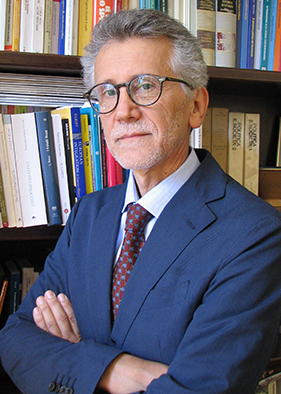October 2021, Year XIII, no. 10
Piero Ignazi
Political Analyst or Political Scientist?
"Political analysts have more of an amateur interest in political phenomena while political scientists study them using the scientific method, i.e. basing their analyses and hypotheses on verifiable empirical data. However, today insisting on this distinction in the public debate can be a little deceptive."
Telos: You are often called a ‘political analyst’, and unlike academics, many people don’t really know what this is. What does a political analyst do?
Piero Ignazi: The term ‘political analyst’ entered journalism jargon 10 or 15 years ago and creates a little confusion. Anyone who writes about politics, whether they are a philosopher or anything else, is called a political analyst, overlooking the fact that a branch of studies actually exists called ‘Political Science’. However, although there were many illustrious political scientists in Italy in the early history of the discipline at the beginning of the 20th century, like Gaetano Mosca and Wilfredo Pareto, and Robert Michels, the first person to empirically analyse political parties, political science had to work hard to be recognised after World War II as an independent discipline. There are many reasons for this: ranging from most of Italian culture’s hostility to the empirical sciences, starting with the idealism of Benedetto Croce, to the exploitation that fascism made of it when it inaugurated the 'Fascist Faculty of Political Science' in Perugia. Giovanni Sartori introduced modern Political Science, according to now universally accepted disciplinary standards, into Italian universities when he was hired as the first Political Science Professor in 1959 and the first tenured Professor in 1966. Since then, Political Science has taken its place within the academic landscape and rose to the forefront internationally with the generation following Sartori, the baby-boomer generation. This premise was necessary to point out the difference between ‘political analysts’ and ‘political scientists.’ Political analysts have more of an amateur interest in political phenomena while political scientists study them using the scientific method, i.e. basing their analyses and hypotheses on verifiable empirical data. However, today insisting on this distinction in the public debate can be a little deceptive. So, even people like me, with the professional background of a political scientist, are often called political analysts like other (brilliant) colleagues of mine who however have an entirely different educational background in history, philosophy, law or sociology.
In the 2000s, even though there has been discussion about how the death of ideology has distanced the new generations from political activism, post-ideological parties that are light and liquid have been spoken of in positive terms.
However, today, the impression is that a growing number of citizens have a hard time even understanding the sense and usefulness of politics. As you see it, does politics have a future? And is it realistic to think that parties, that are sound, structured and rooted in society and the local areas, will re-emerge?
Today, political parties are much different from what we are used to, i.e. the mass parties of the 20th century. The conditions that gave rise to the formation and complete development of those types of parties disappeared starting in the early ‘80s. At that time, the transformation from an industrial to a post-industrial society, secularisation, the spread of consumption and the new media, the emergence of priorities connected to quality of life and personal self-realisation led to a transformation both of the internal dynamics of parties and to their relationship with society. In an extreme nutshell, party leadership was becoming more and more autonomous, parties’ connection to an ideology or a specific area of society (the working class or faith-based) was becoming looser and looser, many different interest groups were emerging and parties’ membership base was shrinking. The pace of this change began to pick up over the subsequent decades. Then, the invasive spread first of the media and now of the internet, economic restructuring under the banner of neo-liberalism and labour fragmentation and, finally, the liquidity of social relationships (less frequent and fleeting, no longer linked to sound associative structures) put the activities of political parties, as they were conceived in their early history, on the ropes. Whereas first they were a tool of political participation, mobilisation and socialisation/education, a place for the ‘recognition of equals’ who share the same values and a bond of ‘common political identity’, now they have mainly become a place to select people aspiring to public office. The discussion, the shared, collective elaboration of political choices has given way to centring people’s efforts on elections. Parties are no longer a gathering place where people interact with others, share values and work toward a common goal. Instead, they are a springboard to a career. And this is pushing parties away from the public sentiment.
What are the prospects for the European socialist parties now that, at the end of the age of Blair, people don’t seem to be interested in a return to the programmes and languages of social democracy (full employment, the social state)?
Socialist parties are at a historic crossroads and, if I may be blunt, risk being fatally marginalised like their historic opponents: the liberals and Christian Democrats. The basic reason is simple. They have lost their mission, which was to defend the underprivileged members of society.
The socialist parties represented the popular classes and clashed with the representatives of the more wealthy classes. There was a clear conflict of interests.
All this is now gone, in part because, as I said before, industrial society, with its well-defined classes, has vanished and in part because the turn-of-the-century change in the economy (and society) favoured the wealthy classes. The class struggle is over, and the workers lost. They hung in there until the early 2000s because they compensated for the loss in popular consensus with the backing of the new educated, urbanised middle classes that had become closer to the socialists, not because of their interests but because they shared many of the “human” values specific to the old socialist tradition. But in recent years, a lot of underprivileged electors have started to flee and feed the populist powers. Managing to win back these voters without losing the neo-bourgeoisie newcomers is a very difficult challenge for the socialists.
One issue we think has been handled in a demagogical way is the public financing of political parties. What are your thoughts on this?
Political parties have been more generously financed and less controlled in Italy than anywhere else in the world. Then, after another wave of scandals, in early 2010, the pressure of public opinion became so great that they eliminated all State contributions for political parties. And now we are the only ones in Europe, along with Switzerland, that do not publically finance its parties. Anti-party demagoguery has surpassed all reason, and instead of establishing effective rules to combat corruption and misuse of public funds and reasonably reducing the cornucopia of money handed out in the last years, all public backing was cut.
It’s time Italy restored some rules regarding public financing that are in line with other European democracies.
Marco Sonsini
Editorial
“The class struggle is over”. We have read and heard this phrase in TV monologues and in the columns of many political analysts. But Piero Ignazi is a political scientist and adds an oft-neglected note: “and the workers lost it.” This is something that needs to be pointed out because it reverses the meaning of its premise: the class struggle is over, but not simply because, in the transition from an industrial society to a post-industrial society, the conditions for the reproduction of the conflict between the classes have lapsed, but because Western deindustrialisation has led to the defeat of one of the two participants in it. This result is epoch-making and has jeopardised not only the historic social and wage conquests of European workers, but their very survival as wage labourers simply because factories throughout the world have moved elsewhere and in Europe either there is no work or people can’t live off their work (i.e. their wages). If we look at the last 40 years, it is hard to deny that the end of the class struggle and the crisis of the political parties are two sides of the same process of decline, where the European socialist parties seem to be the main victims.
Yet these parties were the first, at the dawn of the 20th century, to oppose their adversaries’ cliques by forming a political party in the modern sense of the term, with its mechanisms, ideological cohesion and cooperation with the workers’ movement.
However, we must also acknowledge that socialist parties’ failure to protect the working classes, as they were supposed to do, is an integral part of any non-consoling explanation for the historic defeat of both of them. In the early ‘80s, French socialist François Mitterrand sacrificed the plan that got him elected prime minister for the fixed exchange rate and free movement of capital – the economic dogma European integration is based on – and embraced austerity, allowing discontent to spread like wildfire and giving rise to the first big success of the National Front. Devoted to the imperative of competition, in the early 2000s German Social Democrat Chancellor Gerhard Schröder embraced wage deflation by providing legal coverage for underpaid work through the infamous “mini-jobs”, rendering the SPD, which today rejoices over a very shaky 25%, totally irrelevant.
Meanwhile, wracked by internal conflict over income policy, union relations and participation in the single market, weakened by its split from the moderate, Europeanist part of the party, British labour was unable to withstand neoliberal hegemony and, in the end, embraced its agenda under Tony Blair, though later it was left with neither reason nor remedy when the model it had accepted as inevitable began to break down. But was there really no alternative? Sure, for the socialists, accepting an international economic regime based on the movement of capital and (therefore) on fiscal competition and low wages meant agreeing to “do the dirty work”, with perhaps some collective concessions for the oldest workers, hoping to be able to contain the cost when it would be time to the elections. But that’s not what happened, and the European Left is now on the brink of extinction.
Ignazi notes that the contribution of the thinking, lay, progressive middle class is no longer enough to stop the haemorrhaging of popular votes. We should also add that, given the state of things, the European left-wing parties have come to a crossroads: they can either restore meaning and substance to the age-old battle for the dignity of work or follow the American democrats on their adventure in identity politics, making them the party of naturalised immigrants and shoulder the responsibility of importing the American model of consensus building founded on the duality of natives vs. newcomers. In this case, the result would be to definitively liquidate democracy as we came to know and conquer it in the 20th century.
Again, on the October cover of PRIMOPIANOSCALAc we feature a white page torn to reveal a portion of the interview in Italian and English, with an insect looking up at the words.
For Ignazi, we have chosen the Praying Mantis, which got its name from the Greek μάντις, which means prophet or seer. Its name refers to the unique position of its front legs, which make it look like a person praying. This is why it is seen as bringing deep inner peace and as a symbol of meditation practices. It is the only insect that can see the world in 3D and has special stereovision that helps it capture moving objects. Jean-Henri Fabre, the father of entomology, argued that other insects can only see, but the mantis can observe!
Mariella Palazzolo

Piero Ignazi is Professor of Comparative Politics in the Political and Social Sciences Department of the University of Bologna and Associate Professor at the Institut d'études politiques de Paris (aka Sciences Po) in Paris.
From 2006 to 2014 he was President of the Research Committee for Political Sociology for the International Political Science Association (IPSA).
From 2000 to 2014 he sat on the Scientific Committee of the Rivista Italiana di Scienza Politica and the International Political Science Review.
From 2009 to 2012 he was the director of the Italian journal of culture and politics Il Mulino.
He was a columnist for the weekly magazine L’Espresso from 2007 to 2017, for the daily newspaper Il Sole24Ore from 1993 to 2012, for the daily newspaper La Repubblica from 2012 to 2020 and since 2020 for the newspaper Domani.
His research has been focussed on studying the political parties of Western Europe and he has authored and co-authored numerous publications, the most recent of which include:
Extreme Right Parties in Western Europe (2006), Italian Military Operations Abroad. Just Don't Call It War (2012), I Partiti Italiani dal 1945 al 2018 (2018), Party and Democracy. The uneven road to party legitimacy (2021).
When we asked him to talk about something personal, about something he loves, a hobby, this is how he answered: “What I love most is conviviality, but it doesn’t lend itself like stamp collecting does…”
Piero was born in Faenza, in the province of Ravenna, and he is 70 years old.
Marco Sonsini







SocialTelos